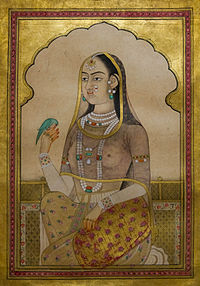| Zeb-un-Nissa | |
|---|---|
| Shahzadi of the Mughal Empire | |
 A portrait of Zeb-un-Nissa. It's currently in Metropolitan Museum of Art | |
| Born | 15 February 1638 Daulatabad, Mughal Empire, present-day Aurangabad India |
| Died | 26 May 1702 (aged 64) Delhi, Mughal Empire, present-day India |
| Burial | |
| House | Timurid |
| Father | Aurangzeb |
| Mother | Dilras Banu Begum |
| Religion | Sunni Islam |
Zeb-un-Nissa (Persian: زیب النساء)[1] (15 February 1638 – 26 May 1702)[2] was a Mughal princess and the eldest child of Emperor Aurangzeb and his chief consort, Dilras Banu Begum. She was also a poet, who wrote under the pseudonym of "Makhfi" (مخفی, "Hidden, Disguised, Concealed One").
Imprisoned by her father in the last 20 years of her life at Salimgarh Fort, Delhi, Princess Zeb-un-Nissa is remembered as a poet, and her writings were collected posthumously as Diwan-i-Makhfi (Persian: ديوانِ مخفى) - "Complete (Poetical) Works of Makhfi".[3]
- ^ Also romanized as Zebunnisa, Zebunniso, Zebunnissa, Zebunisa, Zeb al-Nissa. زیب Zēb means "beauty" or "ornament" in Arabic and نساء Nissa means "women" in Arabic, Zebunnisa means "most beautiful of all women"
- ^ Sir Jadunath Sarkar (1979). A short history of Aurangzib, 1618–1707. Orient Longman. p. 14.
- ^ Lal & Westbrook 1913, p. 20.